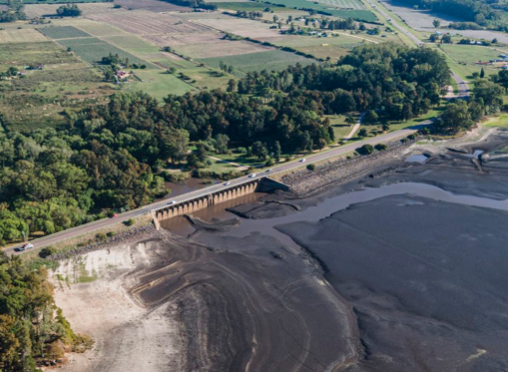Residents complain of salty tap water as Uruguay suffers its worst drought in half a century
By Guillermo Garat
Residents of Uruguay’s capital are increasingly exasperated after two months of salty-tasting tap water that has damaged water heaters, boosted demand for bottled water and reportedly caused stomach ailments.
The water “comes out saltier and saltier so you can’t drink it, but you’re thirsty and so you need to drink it,” said homemaker Natalia Moreira, 33, who lives in one of Montevideo’s poorer neighborhoods. She added that she and her children have been suffering stomach aches and diarrhea.

Low water levels at the Canelón Grande reservoir near Montevideo.
“Now I have a coffee and go straight to the bathroom. Before, that didn’t happen to me,” Moreira said.
People in Uruguay have always been able to safely drink the water that comes from their taps, unlike in some other Latin American countries. But the country is now suffering its most severe drought in 54 years, following decades without investment in freshwater reservoirs. The reservoir behind Uruguay’s largest dam, Paso Severino, is less than 3% filled.
The Santa Lucia River, one of the most important waterways in the nation, supplied fresh water to Montevideo and the surrounding area for more than 150 years — until the first days of May of this year. Authorities began drawing water instead from the Rio de La Plata River.
The only near-term solution is rain, says President Luis Lacalle Pou.
He has warned that water quality is likely to worsen before it improves. In early May, the health ministry doubled the maximum allowable levels of chloride and sodium. Those values are likely to increase further, Lacalle Pou has warned.
Levels in May and June of chloride, sodium, total dissolved solids, iron and trihalomethanes — a compound that has been associated with certain cancers — already have exceeded average values previously allowed by drinking water regulations in Uruguay, the Regulatory Agency For Water and Energy said.
Whether the new water regulations will translate into adverse effects is an ongoing debate.
Arturo Briva, dean of medicine at the University of the Republic, wrote in a letter to Montevideo’s mayor Friday that there is little evidence of such effects so far, but said that doesn’t mean they aren’t happening.
With more questions than answers, plus conflicting claims about the water’s safety, it’s small wonder residents are leery. And anecdotal reports abound. Álvaro Sosa, 31, said he no longer has fully solid bowel movements.
“That worries me,” said Sosa, 31, who lives with seven others in Montevideo’s working-class Malvín Norte neighborhood. “More or less the same thing happens to all of us.”
Health officials have pushed back against widespread claims that the water causes stomach issues. The health ministry has said the ailments are more likely due to viruses, and assured the public as recently as two weeks ago that the water “is suitable for human consumption.”
However, the ministry has also cautioned that people suffering from certain health conditions and babies under two should not drink water from the tap.
Widespread concern has left residents of Uruguay’s Montevideo and Canelones departments scrambling for bottled water, and increased demand has boosted its cost. The price of a six-liter drum of water jumped 10% in June from May, according to the economy ministry.
__________________
Credit: Associated Press





















